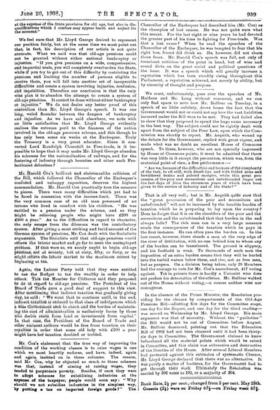We feel sure that Mr. Lloyd George desired to represent
our position fairly, but at the same time we must point out that in fact, his description of our article is not quite. accurate. What we said was that old-age pensions could not be granted without either national bankruptcy. or injtuiltlet: "If you give penSidtiN bn a wide, comprehensive; and impartial Stale, yda Will completely overburden the State; while if ydti try to get out of this difficulty by restricting the PeriSionS and limiting the nuitiber of persons eligible to receive their, on will fill into another set of insuperable diffietiltlea and Create a etystain involving itijustiee, tionfintion; raid iiiqult1tion Therefdre odt echitfineibia is that the only *hal plan is to abandon the attempt to create a system of old-age pensions. It cannot be done without tither bankruptcy di injuatiee." tre do net desire any better proof a this contention than Mr. Lloyd George's Speech. It Was one long, weird flounder betWeen the dengue of bankruptcy and injustice. As we have said elsevibere, we note with nb little satisfaction that idr. Lloyd George evidently realises the extreme peril to the finances of the ndtion involved in the old-age pensions scheme, and this though he has only been some six weeks at the Exchequer. Truly the Treasury is a Very great educator. Since it con- verted Lord Randolph Churchill to Free-trade, is it im- possible to hope that it may make Mr. Lloyd George abandon his Schemes for the nationalisation of railways, and for the fostering of industry through bounties and other such Pro- tectionist delusions ?










































 Previous page
Previous page